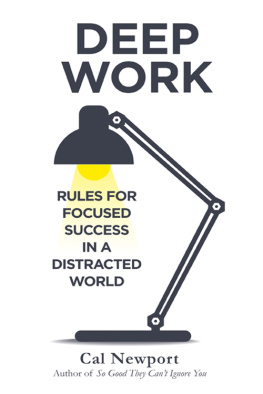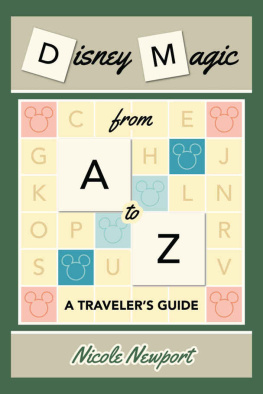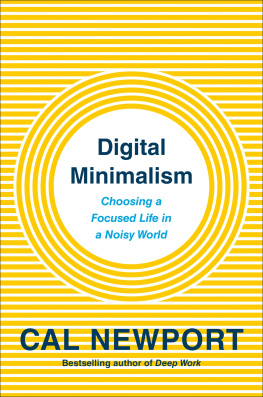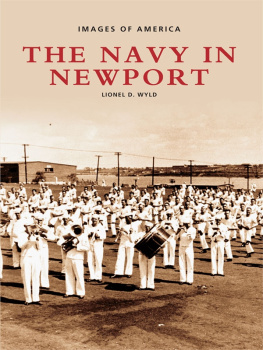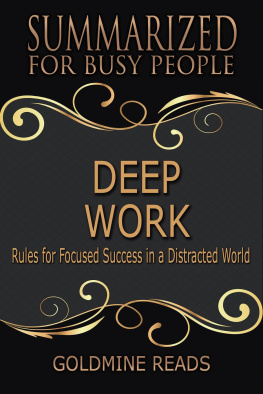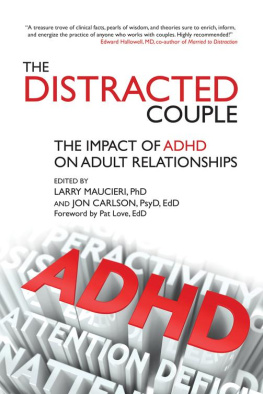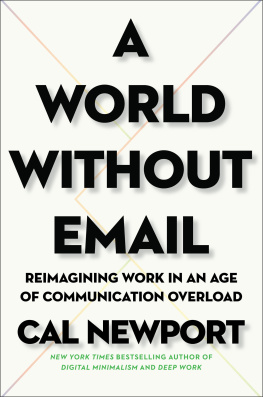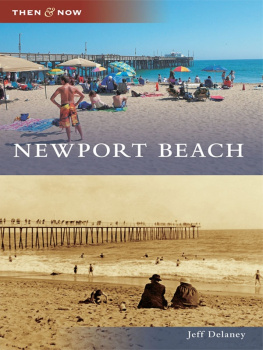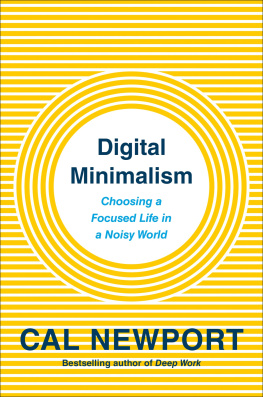Newport - Deep work: rules for focused success in a distracted world
Here you can read online Newport - Deep work: rules for focused success in a distracted world full text of the book (entire story) in english for free. Download pdf and epub, get meaning, cover and reviews about this ebook. City: London, year: 2016, publisher: Little, Brown Book Group;Piatkus, genre: Romance novel. Description of the work, (preface) as well as reviews are available. Best literature library LitArk.com created for fans of good reading and offers a wide selection of genres:
Romance novel
Science fiction
Adventure
Detective
Science
History
Home and family
Prose
Art
Politics
Computer
Non-fiction
Religion
Business
Children
Humor
Choose a favorite category and find really read worthwhile books. Enjoy immersion in the world of imagination, feel the emotions of the characters or learn something new for yourself, make an fascinating discovery.
- Book:Deep work: rules for focused success in a distracted world
- Author:
- Publisher:Little, Brown Book Group;Piatkus
- Genre:
- Year:2016
- City:London
- Rating:3 / 5
- Favourites:Add to favourites
- Your mark:
- 60
- 1
- 2
- 3
- 4
- 5
Deep work: rules for focused success in a distracted world: summary, description and annotation
We offer to read an annotation, description, summary or preface (depends on what the author of the book "Deep work: rules for focused success in a distracted world" wrote himself). If you haven't found the necessary information about the book — write in the comments, we will try to find it.
Deep work: rules for focused success in a distracted world — read online for free the complete book (whole text) full work
Below is the text of the book, divided by pages. System saving the place of the last page read, allows you to conveniently read the book "Deep work: rules for focused success in a distracted world" online for free, without having to search again every time where you left off. Put a bookmark, and you can go to the page where you finished reading at any time.
Font size:
Interval:
Bookmark:
So Good They Cant Ignore You
How to Be a High School Superstar
How to Become a Straight-A Student
How to Win at College
Published by Piatkus
ISBN: 978-0-349-41191-0
Copyright 2016 Cal Newport
The moral right of the author has been asserted.
All rights reserved. No part of this publication may be reproduced, stored in a retrieval system, or transmitted, in any form or by any means, without the prior permission in writing of the publisher.
The publisher is not responsible for websites (or their content) that are not owned by the publisher.
Piatkus
Little, Brown Book Group
Carmelite House
50 Victoria Embankment
London EC4Y 0DZ
www.littlebrown.co.uk
www.hachette.co.uk
with me all the time; no one else is allowed in there except with my permission.
In his book Daily Rituals, journalist Mason Currey sorted through various sources on Jung to re-create the psychiatrists work habits at the Tower. Jung would rise at seven a.m., Currey reports, and after a big breakfast he would spend two hours of undistracted writing time in his private office. His afternoons would often consist of meditation or long walks in the surrounding countryside. There was no electricity at the Tower, so as day gave way to night, light came from oil lamps and heat from the fireplace. Jung would retire that I had in this tower was intense from the start, he said.
Though its tempting to think of Bollingen Tower as a vacation home, if we put it into the context of Jungs career at this point its clear that the lakeside retreat was not built as an escape from work. In 1922, when Jung bought the property, he could not afford to take a vacation. Only one year earlier, in 1921, he had published Psychological Types, a seminal book that solidified many differences that had been long developing between Jungs thinking and the ideas of his onetime friend and mentor, Sigmund Freud. To disagree with Freud in the 1920s was a bold move. To back up his book, Jung needed to stay sharp and produce a stream of smart articles and books further supporting and establishing analytical psychology, the eventual name for his new school of thought.
Jungs lectures and counseling practice kept him busy in Zurichthis is clear. But he wasnt satisfied with busyness alone. He wanted to change the way we understood the unconscious, and this goal required deeper, more careful thought than he could manage amid his hectic city lifestyle. Jung retreated to Bollingen, not to escape his professional life, but instead to advance it.

Carl Jung went on to become one of the most influential thinkers of the twentieth century. There are, of course, many reasons for his eventual success. In this book, however, Im interested in his commitment to the following skill, which almost certainly played a key role in his accomplishments:
Deep Work: Professional activities performed in a state of distraction-free concentration that push your cognitive capabilities to their limit. These efforts create new value, improve your skill, and are hard to replicate.
Deep work is necessary to wring every last drop of value out of your current intellectual capacity. We now know from decades of research in both psychology and neuroscience that the state of mental strain that accompanies deep work is also necessary to improve your abilities. Deep work, in other words, was exactly the type of effort needed to stand out in a cognitively demanding field like academic psychiatry in the early twentieth century.
The term deep work is my own and is not something Carl Jung would have used, but his actions during this period were those of someone who understood the underlying concept. Jung built a tower out of stone in the woods to promote deep work in his professional lifea task that required time, energy, and money. It also took him away from more immediate pursuits. As Mason Currey writes, Jungs regular journeys to Bollingen reduced the time he spent on his clinical work, noting, who relied on him, Jung was not shy about taking time off. Deep work, though a burden to prioritize, was crucial for his goal of changing the world.
Indeed, if you study the lives of other influential figures from both distant and recent history, youll find that a commitment to deep work is a common theme. The sixteenth-century essayist Michel de Montaigne, for example, prefigured Jung by working in a private library he built in the southern tower guarding the stone walls of his French chteau, while Mark Twain wrote much of The Adventures of Tom Sawyer in a shed on the property of the Quarry Farm in New York, where he was spending the summer. Twains study was so isolated from the main house that his family took to blowing a horn to attract his attention for meals.
Moving forward in history, consider the screenwriter and director Woody Allen. In the forty-four-year period between 1969 and 2013, Woody Allen wrote and directed forty-four films that received twenty-three Academy Award nominationsan absurd rate of artistic productivity. Throughout this period, Allen never owned a computer, instead completing all his writing, free from electronic distraction, on a German Olympia SM3 manual typewriter. Allen is joined in his rejection of computers by Peter Higgs, a theoretical physicist who performs his work in such disconnected isolation that journalists couldnt find him after it was announced he had won the Nobel Prize. J.K. Rowling, on the other hand, does use a computer, but was famously absent from social media during the writing of her Harry Potter novelseven though this period coincided with the rise of the technology and its popularity among media figures. Rowlings staff finally started a Twitter account in her name in the fall of 2009, as she was working on The Casual Vacancy, and for the first year and a half her only tweet read: This is the real me, but you wont be hearing from me often I am afraid, as pen and paper is my priority at the moment.
Deep work, of course, is not limited to the historical or technophobic. Microsoft CEO Bill Gates famously conducted Think Weeks twice a year, during which he would isolate himself (often in a lakeside cottage) to do nothing but read and think big thoughts. It was during a 1995 Think Week that Gates wrote his famous Internet Tidal Wave memo that turned Microsofts attention to an upstart company called Netscape Communications. And in an ironic twist, Neal Stephenson, the acclaimed cyberpunk author who helped form our popular conception of the Internet age, is near impossible to reach electronicallyhis website offers no e-mail address and features an essay about why he is purposefully bad at using social media. Heres how he once explained the omission: If I organize my life in such a way that I get lots of long, consecutive, uninterrupted time-chunks, I can write novels. [If I instead get interrupted a lot] what replaces it? Instead of a novel that will be around for a long time there is a bunch of e-mail messages that I have sent out to individual persons.

The ubiquity of deep work among influential individuals is important to emphasize because it stands in sharp contrast to the behavior of most modern knowledge workersa group thats rapidly forgetting the value of going deep.
The reason knowledge workers are losing their familiarity with deep work is well established: network tools. This is a broad category that captures communication services like e-mail and SMS, social media networks like Twitter and Facebook, and the shiny tangle of infotainment sites like BuzzFeed and Reddit. In aggregate, the rise of these tools, the average knowledge worker now spends more than 60 percent of the workweek engaged in electronic communication and Internet searching, with close to 30 percent of a workers time dedicated to reading and answering e-mail alone.
Font size:
Interval:
Bookmark:
Similar books «Deep work: rules for focused success in a distracted world»
Look at similar books to Deep work: rules for focused success in a distracted world. We have selected literature similar in name and meaning in the hope of providing readers with more options to find new, interesting, not yet read works.
Discussion, reviews of the book Deep work: rules for focused success in a distracted world and just readers' own opinions. Leave your comments, write what you think about the work, its meaning or the main characters. Specify what exactly you liked and what you didn't like, and why you think so.

